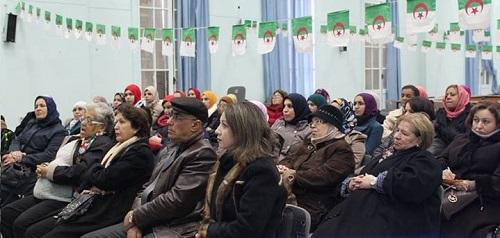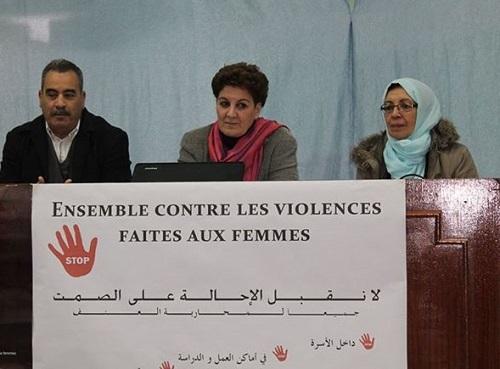As part of the 16 Days of Activism Against Gender-Based Violence Campaign, AWID spoke with two Algerian activists to learn more about violence against women in the country and the strategies and challenges of the feminists working to end it.
In Algeria, the predominantly Sunni Islam North African country, violence against women is widespread, both legally and socially. The 2005 amended Family Code is informed by Islamic law and still discriminates against women, whether in terms of marriage, divorce, inheritance or child custody. In the case of divorce and child custody for example, priority is given to the mother, but if she remarries, she loses her right to custody. This profoundly unequal Code conflicts the country’s Constitution, which stipulates in article 29: “All citizens are equal before the law. No discrimination shall prevail because of bind, race, sex, opinion or any other personal or social condition or circumstance.”
Experience of violence differs greatly depending on location and status
Dalila Iamarene Djerbal, sociologist and coordinator of counselling centre and programs at the Wassila/Avife Network,[1] highlights the connection between legal discrimination and violence against women across all social spheres.
“Discrimination is fundamentally judicial because the law hierarchizes the sexes, which creates a chain of discrimination and inequality across all social spaces, with violence as a measure of maintaining this fundamental inequality. Violence – whether institutional, physical, symbolic, psychological, economic or sexual – keeps everyone in their place. Women will always be subordinate to the authority of men in the family and marriage, even when formal equality is enshrined in law with regards to public life.“
In contrast women make up 65% of college graduates, over one third of judges and half of the teaching, health and public administration sector, although their access to political decision-making positions remains low. According to Soumia Salhi, feminist union activist, and former president of the Association pour l’émancipation des femmes (Association for the Emancipation of Women, AEF), women’s visibilisation is a result of mass education and has produced backlash at the same time.
“The situation of women in Algeria has experienced an upheaval due to the mass education of girls since Independence. The brutal fundamentalist leadership of the 1990s did not prevent girls from being educated, so more women who are now entering the workforce. Women went from domestic seclusion to occupying a huge presence in the public space.” She adds “The emergence of women has finally led to domestic violence being denounced. But this doesn’t happen without resistance. Street harassment and misogyny reflect such resistance to change. Liberal policies have mainstreamed precarious jobs and promoted sexual harassment. Dress codes and segregation derived from traditions and revived in the 1990s under fundamentalist leadership are slowly dissolving but remain alive outside of big cities.”

But large disparities exist between women in Algeria, and violence is amplified by economic and social factors specific to the environment in which they live. In remote rural areas for example, women have less access to education, health and employment than in urban centers, because of a lack of infrastructure and resources in poorer regions. Iamarene Djerbal says that in remote areas, “a girl will be taken out of school because there is no transportation or boarding but a boy will be kept in school to continue his studies. There are few jobs in these regions and even fewer for women who are completely dependent on their surroundings and subject to the patriarchal rules of marrying young.” Salhi adds that “the diktat and the limitations on freedom of movement are stronger among modest social classes than affluent ones, more evident in poor neighbourhoods than in urban centres. They are even more radical in semi-urban and rural areas, although religious fundamentalism affects all social classes.”
There is also the issue of racial discrimination against Algerians from the south and their marginalization in the job market due to the colour of their skin; and access to public spaces is also limited for Berber-speakers, who make up about 20% of the Algerian population and whose language is not recognized as an official language by the State. Iamarene Djerbal says “Sub-Saharan migrants encounter even more violence, especially women, who are verbally abused, extorted, assaulted and sometimes raped” According to her this often happens with impunity, as was the case with Marie Simone, the Cameroonian migrant, gang rape victim on 1 October 2015 in the city of Oran. The case incited substantial mobilization by civil society organizations and on social media because of the refusal of the Police to consider the complaint made by her. Following the case, Femmes Algériennes Revendiquant leurs Droits (Algerian Women Claiming their Rights, FARD) published a statement signed by a dozen NGOs as well as an online petition recalling Algeria’s obligations to respect the right of all individuals to file a complaint.[2] The mobilizations led to the filing of the complaint, but reveal the deeper issue of access to justice for women victims of violence in Algeria.
Advocating for justice hampered by political calculations
In the absence of legal protections for victims of violence, the collective "Stop à la violence! Les droits aux femmes maintenant" (Stop Violence! Rights for Women Now) formed in 2010. The collective is made up of different organizations and activists with the purpose of running campaign to advocate for the adoption of a legal framework to punish violence against women. Salhi, coordinator of the collective, brings to light the different advocacy steps needed for such a law: “the collective held several seminars, bringing together a number of figures and activists; pertinent documents were disseminated, including advocacy text. We acted so that the media would pick up our actions. In early 2015, despite strong resistance from traditionalists, the government tabled a bill before the National People’s Congress. The very violent criticism proclaimed that the bill was against Islam[3].

That critique was preceded by a misinformation campaign by private television stations. The government stood strong, upholding the bill, which Congress passed on 5 March. The law represents a step forward, by criminalizing domestic violence and provoking an important debate in society. But it includes an unfortunate clause, the pardon clause, which exempts the perpetrator from prosecution if pardoned by the victim. We think that this provision cancels part of the benefit of the law but it’s still a very positive first step. Our current campaign is focused on its adoption in the Senate.”
For Iameren Djerbal, “the pardon clause” is essentially “additional pressure on the already vulnerable victim to not go all the way with demanding justice. We know that there are few complaints that go to trial because the perpetrator, the family, those around them, the difficulties of accessing justice, the lack of autonomy and resources force victims to resign, to suffer through the violence until being mutilated or killed.” The sociologist also considers one of the reasons why the bill has not yet passed in Senate – eight months following its vote in Congress – related to its use as a political tool[4] by different stakeholders.
Beyond the Law: Women continue organising in challenging circumstances
“Enacting the law, sooner or later, will not be enough to protect from global violence in the millennium. It’s society that we want to convince, social mentality and practices that we want to change. Forty years of the feminist struggle have validated our conviction that this is a global fight. Without education, without fair jobs with adequate pay, without the social means, the fight against backward mentalities would be in vain,” highlights Salhi.
These past years, counselling centres for victims of violence have multiplied. For example, the Wassila/Avife Network works to provide medical, psychological and legal support to victims of violence. “We conduct outreach work with women, awareness raising and training, whether related to health, rights or media. We do advocacy work through publications and reports to authorities. We meet among organizations around collective actions to denounce violence or advocate for laws that protect the integrity and dignity of women,” explains Iameren Djerbal. But Salhi says that “it’s up to the State to take charge of counselling and support for victims” because the means and the resources of organizations are not enough to end this violence.
One of the biggest challenges Algerian organizations face relates to rules that limit their activities. The 2012 Law 12-06 on Associations grants authorities the power to refuse associations from registering, holding public meetings, demonstrations or even accepting foreign funds. Bureaucratic ploys can provide governments with excessive power that impacts the work of organizations. “This hampers democratic expression, especially at the union and political levels. Rallies are repressed and marches are forbidden, especially in the capital. Organizations, unions and political parties are reflected, authorized or not, in the press and on private television stations according to the politics of media owners.[5],” says Salhi.
Salhi points out, “Society continues to be dominated by religious traditionalism. Progress is huge but changing the social mindset is slow. For a feminist activist, the hardest part is having your demands and behaviour accepted by your family and neighbourhood,” But she says that the challenge is to overcome the defeatism and the sense of powerlessness that exists and mobilize women to push for change.
Iamarene Djerbal concludes: “We have no choice but to support the victims, expose injustices, demand equal rights between men and women, push for the law on violence against women and the implementing measures to render it effective. We believe in activism, with the need to never lose site of the final objective: citizenship for all, women and men, in a State of rights and social justice.”
